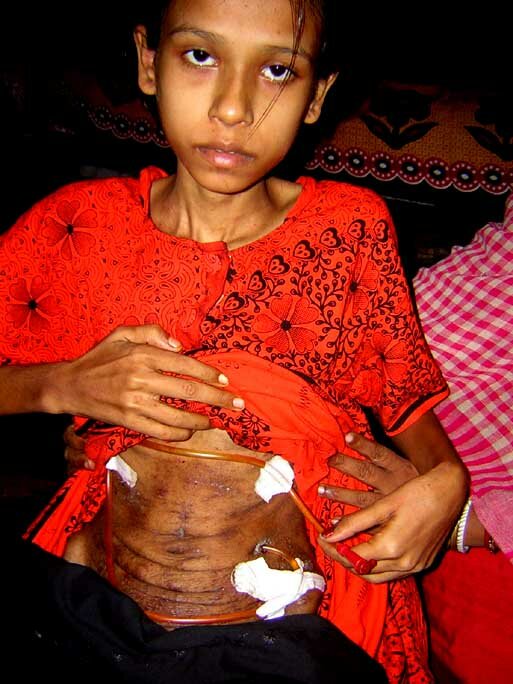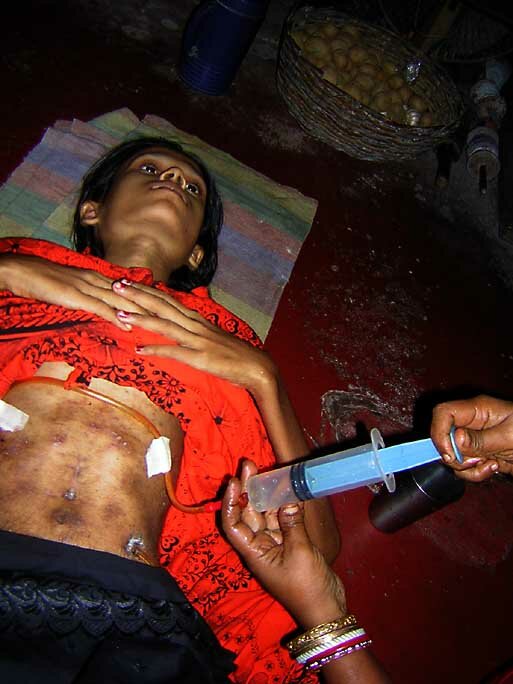The Case of Roopa
Roopa is a young married woman whose in-laws and husband tried to kill her by forcing her to drink acid, when her parents refused to pay them dowry.
Roopa’s insides were burnt and for five months she could not eat, and had to be fed liquid food through a tube in her stomach.


Roopa is one of the many dowry victims abused and threatened by their families in India. Roopa received much-needed medical attention after she was extricated from her abusive in-laws. Many like her are murdered before they can be rescued.
When we met her, she was so emaciated, it didn’t seem she would survive. Her parents were very hard up and could not afford the surgery she badly needed. Being a volunteer group, we had no ready funds for immediate release in emergency situations such as this. We first tried to get a hospital to take her in on a goodwill basis, but none agreed. We then set up an emergency medical fund for her, and the supporters of the campaign responded rapidly and overwhelmingly. Even getting her admitted into a hospital was a challenge as the hospitals were terribly overloaded and refused to admit new patients.
Roopa’s case was so bad, there was no guarantee that she would live. Her donors understood this – and yet they gave generously, and prayed that she would overcome the odds. For a week after her surgery, she seemed to be getting worse, and everyone had given up hope. Then there was a turnaround and against all odds she made it. In fact she got stronger and healthier. After about four months when feminist Gloria Steinem visited the city, Roopa even met with her in person at the American Center.
Thereafter, people from all over, from other countries, would visit her if they happened to come to Calcutta. She represented hope and change to many.
After her recovery, we were helping her to find a new path in life. She was studying and doing well, learning how to type, learning the computer, and meeting new people. She said she wanted to become an office assistant, which was what we were helping her towards (she had very little education). There was also a very bright lawyer fighting her case, and she was seeing a counsellor. But all of a sudden, she returned to her husband and in-laws. Initially, we thought it was because of her little son. So a team of lawyers went to pull her out with the child. But she refused to return. It was a terrible setback for all of us, but the worst was that it totally confounded us.
The challenge has been to redefine our understanding of domestic violence and the psyche of women. My view of domestic violence, like that of many of our supporters, began with this Western assumption, that education and a job is the route to safety and a new life for women. I think, however, that India, with its Asian paradigm that focuses on customs, traditions and family honour, has to be dealt with in a wholly different context.
We have discovered in case after case, all dealing with different issues – domestic violence, dowry threats, attempts at forced abortions, etc. – that women repeatedly make the same choice in India. Many don’t want to prosecute their husbands in court – no matter how criminal his acts are – because they think it is a matter of social shame. They feel it would stigmatise the women more than the men! The fact is that this is true.
Most women don’t want to go against social conventions. In fact many don’t want to leave the marriage. According to some NGOs, women who run away from their in-laws’ house sometimes want the NGOs to negotiate their return, even if the women now have a job and can be independent. This happens even when the in-laws had tried to kill the women.
Women in India may value their marriage status more than they do their own lives! Indian society at large thinks likes this. This is our collective value system. It is grounded in tradition and history – and will take decades to change. It is perhaps the biggest lesson that this campaign has learnt. It is the challenge we have to overcome. The only way to social change is if the perpetrators are convicted through the legal system so it will be a deterrent to others.
There is a general social apathy and, in fact, even support of a social system of violence against girls and women. When violence is so pervasive that it is genocidal, there is a structural flaw in how a society thinks, acts and functions.
Our society has become immune and indifferent to the plight of women. A German supporter, who came to visit Roopa, asked our local driver if he had heard what had happened to her. The driver said very calmly: “But this happens all the time. You see many cases like this.”

















